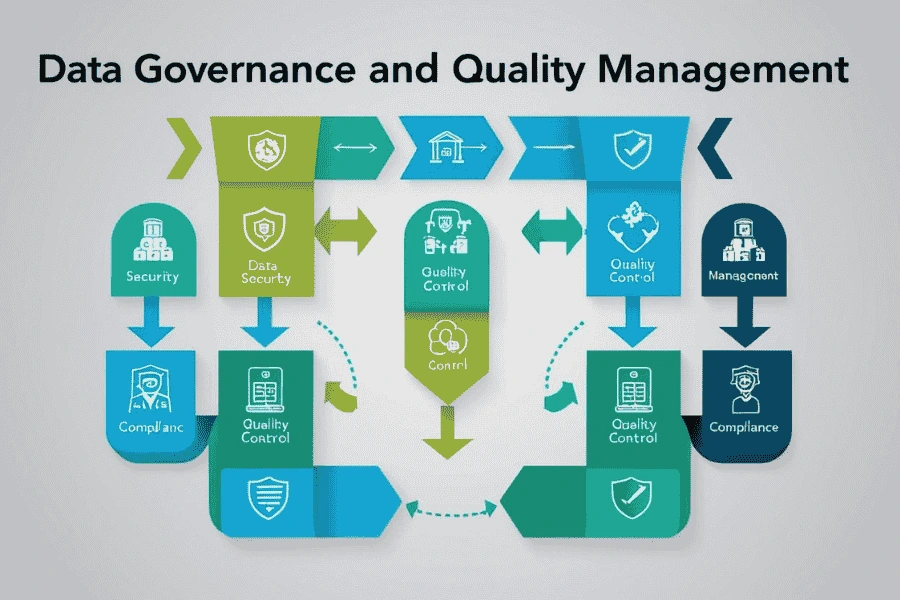Data Governance and Quality Management in BI
Introduction
In today’s data-driven world, Business Intelligence (BI) plays a vital role in helping organizations make informed decisions. The value derived from BI tools and analytics hinges on one fundamental aspect: the quality and management of data. This makes data governance frameworks and data quality management essential elements in any successful BI strategy. Together, they ensure that data is reliable, secure, and aligned with business needs, empowering organizations to gain meaningful insights and maintain regulatory compliance.

Understanding Data Governance in Business Intelligence
Data governance in BI involves establishing a formal structure of policies, roles, and procedures to oversee the entire lifecycle of data. A well-defined data governance framework provides clear guidelines on data ownership, stewardship, and usage, ensuring that all data assets are managed consistently across the enterprise. By implementing data governance best practices, organizations can safeguard data integrity and establish accountability through clearly defined data governance roles and responsibilities. Additionally, these practices help organizations meet stringent data privacy regulations such as GDPR and HIPAA by controlling access and usage of sensitive data.
The Importance of Data Quality Management in BI
While governance creates the blueprint, data quality management focuses on the accuracy and fitness of data used in BI. Critical aspects like data quality metrics, accuracy, completeness, and timeliness determine whether the data can be trusted for decision-making. To maintain data quality, organizations utilize various data quality tools for BI and data profiling tools. These solutions help identify and resolve data quality issues in BI, such as incomplete records or inconsistencies. Applying effective data quality improvement techniques ensures the data feeding BI reports is clean, consistent, and actionable.
Why Data Governance and Quality Matter in BI
Integrating governance and quality management is key to building trust in BI systems. Without these, organizations risk basing decisions on flawed data, which can lead to costly mistakes. Strong governance coupled with diligent quality management helps streamline processes, reduce risks, and improve compliance with evolving data privacy regulations. Furthermore, robust governance and data quality practices promote a culture of data responsibility, enabling businesses to confidently leverage BI for competitive advantage.
Common Challenges in Governance and Quality Managemen
Implementing effective data governance and quality management frameworks is not without challenges. Organizations often face difficulties such as data governance challenges caused by fragmented data ownership or lack of collaboration across departments. Another common hurdle is insufficient data literacy, which can impede user compliance with governance policies and affect overall data quality. Many companies also struggle to integrate legacy systems and automate data quality assessment techniques, complicating consistent enforcement of standards.
How Governance and Quality Work Together
In a well-run BI environment, governance sets the standards and accountability mechanisms, while quality management enforces these through ongoing monitoring and correction. For example, a governance policy may require all customer data to include verified contact details. Data quality metrics and data profiling tools then monitor this requirement, flagging errors and initiating remediation to ensure trustworthy data.
Future Trends in Data Governance and Quality for BI
Looking forward, BI will increasingly depend on advanced technologies like AI to automate data quality monitoring and improve accuracy. Concepts such as data mesh and data fabric will shift governance towards more decentralized models, requiring adaptable frameworks. Compliance with data privacy regulations will remain a priority, driving governance evolution. Organizations that adopt these innovations will better handle growing data complexity and maintain high-quality data for BI success.
Conclusion
In conclusion, the partnership of data governance frameworks and data quality management is foundational to effective Business Intelligence. Together, they ensure data accuracy, security, and compliance providing trustworthy insights that drive better decisions. By addressing implementation challenges and embracing best practices, businesses can unlock the true power of their data assets and thrive in a data-centric world.
Active Events
Maximizing Your Earnings: 7 Strategies for Business Analysts in 2024
Date: Aug 07, 2025 | 7:00 PM (IST)
7:00 PM (IST) - 8:10 PM (IST)
2753 people have registered
Navigating the World of SERP Features: Tips, Tricks, and Strategies
Date: Aug 07, 2025 | 7:00 PM(IST)
7:00 PM(IST) - 8:10 PM(IST)
2811 people have registered
Bootcamps
Data Analyst Bootcamp
- Duration:8 weeks
- Start Date:October 5, 2024
Data Science Bootcamp
- Duration:8 weeks
- Start Date:October 5, 2024
